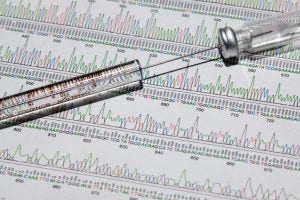
Moderna has successfully transferred personalized cancer vaccine capabilities to its recently opened production facility in Norwood, Massachusetts.
In July 2018, Moderna Therapeutics opened a 200,000 square foot clinical development manufacturing plant in Norwood, Massachusetts to support its pipeline of messenger RNA (mRNA) therapies.
“Since the site opening, we have successfully manufactured clinical grade mRNA and then moved to formulation and went to filling and finally labeling of our vials,” Stéphane Bancel, Moderna’s CEO told stakeholders during his firm’ recent Q4 2018 financial call. “We are now actively working towards vertical integration of critical raw materials like DNA plasmid used as templates to our mRNA, verticals and other raw materials.”

Image: iStock/LennartK
But the firm is now using the site to make the materials for its personalized cancer vaccine (PCV), mRNA-4157, set to begin a Phase II clinical study in combination with Merck & Co.’s PD-1 inhibitor Keytruda (pembrolizumab) in patients with resected melanoma.
“We started our PCV clinical trial in 2017 by making the PCV vaccines at a contract manufacturer in the US using Moderna manufacturing process and the robotics we invented to be able to make one lot personalized for one patient. I am pleased to report that we are now capable of making all of PCVs in Norwood for patients in the remainder of Phase I as well for Phase II.”
According to the firm, the PCV programs are based on the use of mRNA to express neoantigens found in a tumor to elicit an immune response via T cells that recognize those neoantigens, and therefore the tumor. By using the DNA sequence of a patient’s tumor, Moderna aims to deliver multiple unique and personalized neoantigens – up to 34 – in a single vaccine.
For the full year 2018, Moderna recorded total revenue at $35.4 million (€31.5 million) and a net loss of $141.4 million.
The year also saw the firm raise $604 million in its initial public offering (IPO), valuing Moderna at $7.4 billion.
About the Author
You May Also Like

schedl_b_and_w.jpg?width=100&auto=webp&quality=80&disable=upscale)
schedl_b_and_w.jpg?width=400&auto=webp&quality=80&disable=upscale)



